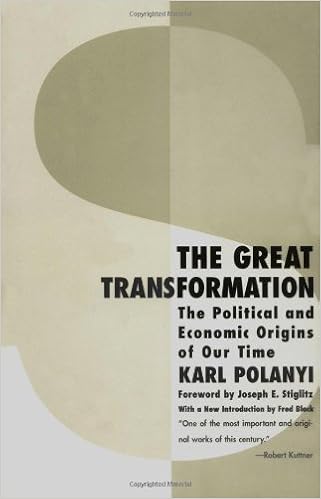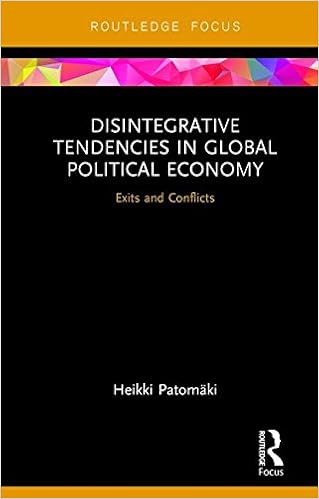The World in a State of Disintegration? An Interview with Heikki Patomäki

A host of new political developments both inside liberal democracies and across the globe, such as the rise of authoritarianism, extreme nationalism and a general backlash against globalization, seem to be suggesting that the world may be in the midst of a new political era and an emerging redistribution of global political power with unforeseen and possibly unintended consequences, perhaps similar to those that led to the disintegration of the world political economy in the early part of the twentieth century. At least this is the partial interpretation offered in the interview below by renowned social scientist, civic and political activist Heikki Patomaki, Professor of World Politics at the University of Helsinki, Finland, and former Research Professor of Globalization and Global Institutions at RMIT University, Melbourne, Australia. Patomäki is the author of numerous books in global politics, including, among others, 'Politics of Civil Society: A Global Perspective on Democratization', The Great Eurozone Disaster; A Possible World: Democratic Transformation of Global Institutions', and, most recently, 'Disintegrating Tendencies in Global Political Economy'.
C. J. Polychroniou: From Brexit to the rise of far-right movements and parties throughout Europe, and from Trumpism in the US to the complete eclipse of geopolitics over international law, it is quite obvious that there are world-historical mechanisms and processes in motion generating disintegration and conflict across the world. What are those mechanisms and processes responsible for fragmentation and the erosion of the liberal international order?
Heikki Patomäki: A very important question. A possible and rather popular explanation is that we are going through a new double movement, now on a truly global scale. Karl Polanyi introduced the concept of double movement in his Great Transformation written during the Second World War. For Polanyi, the 19th century laissez-fair system was not natural; it was a historically constructed social institution. The 19th century industrialising market economy generated wealth, but the social consequences of “the stark utopia” were devastating. These consequences led to spontaneous attempts by society to protect itself against the markets. Drawing on Polanyi, a number of colleagues have suggested that we are seeing something similar now in the early 21st century, following decades of neoliberal globalization.
 This insight is not entirely incorrect, but it has its limits and can be misleading. Polanyi’s concept of the market was borrowed from neoclassical economics and it was stripped off of anything social. There is also more than a trace of functionalism in Polanyi: the double movement is not only supposed to be inevitable but also to occur almost semi-automatically. Because of Polanyi’s highly idealised and abstract concept of the market, and because of his functionalism, he is misled to lump together all forms of ‘social protection’, even though many forms of protection in the late 19th and early 20th century served the purposes of, say, large landowners’ specific interests or militarist nationalism.
This insight is not entirely incorrect, but it has its limits and can be misleading. Polanyi’s concept of the market was borrowed from neoclassical economics and it was stripped off of anything social. There is also more than a trace of functionalism in Polanyi: the double movement is not only supposed to be inevitable but also to occur almost semi-automatically. Because of Polanyi’s highly idealised and abstract concept of the market, and because of his functionalism, he is misled to lump together all forms of ‘social protection’, even though many forms of protection in the late 19th and early 20th century served the purposes of, say, large landowners’ specific interests or militarist nationalism.
There is no automatic historical pendulum or a simple scheme of world history. We have to specify the relevant mechanisms and processes in much more detail. The discrepancy between territorial states and liberal world economy opened up the possibility for a self-reinforcing process of neoliberal globalization in the 1970s and 1980s. An alternative path was possible, but once the process was set in motion, the dynamic processes of the world economy have shaped conditions everywhere to strengthen and deepen the original choices. The utopia of self-regulating markets have time and again justified further political choices along the same path, but overall, history seems to work itself out through negative rather than positive unintended consequences; through counterfinality rather than invisible hand. This is because the planetary economy is characterised by uneven growth and manifold contradictions – such as fallacy of composition and other forms of counterfinality – that have resulted in diverse negative and mostly unintended consequences, such as less growth, higher levels of unemployment, and more insecure living conditions in many parts of the world.
The lack of effective demand is a key source of many contradictions in the global political economy and it can aggravate the consequences of other contradictions. For instance, a widely followed policy of internal devaluation tend to prove contradictory due to decreasing effective demand in the world economy as a whole. The world economy is still growing, and this growth has also ecological consequences, but in terms of sustainable real welfare, the world has become an uncertain place for large parts of the world population. Experiences diverge in the details of prevailing policies and socio- and politico-economic developments, and in terms of ethico-political responses to those developments, but there are recurring patterns that appear in a rather similar fashion across the world.
The economic troubles co-caused by these contradictions, which also intensify the processes of deindustrialization in the OECD world and elsewhere, generate increasingly antagonistic self-other relations. The key problem lies in heightened existential uncertainty and insecurity, which can trigger various social-psychological mechanisms, such as resentment and emotional distancing. These mechanisms transform fear and insecurity and other related negative emotions experienced in specific circumstances – depending also on economic fluctuations – into anger, resentment, and even hatred.
These processual mechanisms may affect only some of those belonging to the vulnerable parts of the population. Spontaneous articulation of emotional responses and related reasoning about the validity of a rule involve a limited number of individuals and groups. But in the complex and relational processes of public opinion formation, where the media can greatly amplify the volume of messages (especially it those messages accord with their views or interests), relatively small primary shifts can result in major changes in hegemonic or dominant political constellations. Moreover, political entrepreneurs and leaders can mobilize meanings from earlier geo-historical layers to gain momentum or to justify their (increasingly authoritarian) rule. Contradictions can thus stimulate retrograde movements of historical change. The big problem is that the associated political shifts tend to deepen and entrench myopic self-regarding orientations, thus aggravating the contradictions of global political economy. This is a process of cumulative causation that has potential to evolve into a major global catastrophe.
Of course there are countertendencies as well. Whereas unrecognised contradictions tend to have negative unintended consequences, often amounting to self-reinforcing processes, the most important countertendencies operate through learning to see things from the point of view of others and from the point of view of the whole. Ideology-critique can play a key role in this learning process and obviously a lot hinges upon prevailing forms of economic theory. There is some room for alternatives at every level of social organisation. However, contradictions can best be overcome by collective action and by building adequate common institutions. Progressive shifts in this direction would require forms of reflexivity –capacity to reflect upon the conditions of one’s existence and actions – that can generate aspects or elements of ’we’-identity on a global scale.
The euro crisis of 2010 is over, with the exception of Greece which remains mired in debt and financially distressed, yet the processes of European disintegration seem to be spreading rather than retreating. What’s the explanation for this phenomenon?
This question needs a bit of unpacking and a couple of qualifications. I do not think the crisis is over because the EU remains existentially fragile. The institutional problems and contradictions of the EMU design have not been resolved. At the same time it is also true that even a relatively short-lived semi-recovery of the European economy could give time for the EU to evolve in novel directions, and semi-recovery is exactly what seems to have been happening in Europe in 2017-18. The EU Commission is celebrating Eurobarometer results according to which trust in the EU is growing – it appears to be at its highest level since 2010, and support for the euro seems greater than it has been since 2004. But as your question indicates, this is a partial truth at best. Changes in hegemonic or dominant political constellations are not so easily reversed. Especially the social democratic parties – by and large strongly committed to the EU project – have lost significant parts of their votes to right-wing nationalist-populist parties that are usually very sceptical about the EU project. Moreover, because of these and similar shifts and related fragmentation of the political landscape in Europe, German difficulties in forming a new government are now typical. The driving forces of European integration, as we have seen it so far, have lost momentum or been incapacitated.
Some of the key EU players have been developing a roadmap to forge ahead with the integration process. They call for a broad consensus, involving a narrative for the past and a vision for a more integrated future. The aim is to create a more ‘convergent’ and ‘resilient’ Union. Despite a few good proposals, the current approach is mostly based on ‘more of the same with some modifications’. Under these circumstances, what seems to be emerging as an alternative to single-market/single currency path of integration is an increasingly disciplined and militarized Union. Common external enemies can spur unity. The exit of Britain may well facilitate consolidation of the remaining EU via escalating conflict with Russia, the constant ‘state of emergency’ related to the refugee crisis and imagined or real terrorist attacks (often by migrant sufferers of class inequalities), increasingly strained relations with Turkey, economic competition with China and India, and the global consequences of Trump. This path resonates with the trend toward increasingly antagonistic self-other relations, but provides an alternative story-line to the nationalisms of the past. The identification of threats to “our European” existence can create unity and acceptance, or at least acquiescence, to strengthening the disciplinary rule and military nature of the EU.
In the midst of all this lies the tragedy of Greece. What happened in 2015 was a step toward a more disciplinary Union. Wolfgang Schäuble wanted to teach a lesson and he succeeded in doing so. This lesson hardened apparent unity at one level, but it also reinforced stereotypes and antagonisms. Schäuble’s lesson resonates with an individualist understanding of the causes of the debt crisis. The Greeks are not only ‘tempted to laze in the sun under an orange tree’ but are also corrupt. They have tried to live on debt alone for too long; they should start to save and work like good Northern protestants (and catholic Germans). Accordingly, no systematic consideration has been given to the institutional flaws and contradictions of the EMU. Germany’s economic policies are left off the hook of any responsibility for the current situation. All this leaves Greece alone and is definitely not good for the future of the European integration process.
What about the rise of far-right, xenophobic and ultra-nationalist parties not only in Europe but in Asia and other parts of the world as well? Is this simply a revolt against globalization?
National–populist developments can indeed be observed in Asia and other parts of the world, for example in Indonesia, becoming particularly marked during the 2014 presidential election and under the subsequent Widodo administration; and in the Philippines, since Duterte was elected President May 2016. Right-wing nationalism and populism are not just a Western phenomenon.
The cases of China and India may appear to be more difficult to explain than Brexit or Donald Trump or even Vladimir Putin’s Russia or Recep Tayyip Erdoğan’s Turkey. The two most populous countries have gone through a period of rapid economic growth. Why should they experience a shift toward nationalism and, in the case of India, also toward exclusive Hindu-populism? The Bharatiya Janata Party (BJP) has existed for decades, preceding the era of growth, and is somewhat comparable to Putin’s United Russia. But it is also analogous to the convergence of social forces in Britain that led to Brexit. The BJP-led coalition has supported neoliberal globalization and related policies. One aspect of Indian economic growth is that Western multinational corporations have moved many of their activities to India, contributing to economic growth. India is the second most inegalitarian country in the world and disparities there are growing. As the caste system and other reifications of class differences fade away, rising resentment is directed against different, lower or threatening others, not unlike in Europe, the US and China.
China’s President Xi Jinping’s nationalistically assertive foreign policy combines with advocacy of free trade and globalization, in a context of securing the state’s strong regulatory and fiscal capabilities. In China the rate of investment and saving is very high, which means that consumption has risen modestly in relation to growth (the share of final household consumption declined continuously from 70% in 1962 to 36% in 2007 and has grown only very marginally since then, whereas in the world as a whole this share remains at around 58%). Moreover, the Gini coefficient has risen from roughly 0.3 in the 1980s to 0.49 in the mid-2010s, with the richest 1% of households already owning a third of the country’s wealth.
While economic growth and its positive effects for the growing middle and upper classes have provided legitimacy to the ruling party, and while GDP per capita has continued to rise rapidly, since 1997 the Chinese GPI (Genuine Progress Indicator) has improved only slightly (Kubiszewski et al. 2013, 61–2). Economic improvements seem to have been partly offset by the negative effects of dislocation, commodification and pollution; but they may also have spurred expectations about democratization. A plausible hypothesis is that the Chinese leadership has resorted to the “rally-around-the-flag” effect, habitually articulated in terms of overcoming “the century of humiliation” whilst expressing the rising power of a “harmonious nation” and growing economy, to gain legitimacy.
Moreover, the whole is more than the sum of its parts. States are interacting in the context of contradictory dynamics of the world economy. We may use two partial historical analogies to understand the effects of these interactions. Before the First World War, once the slide towards competing imperialisms and militarisms had started by the early 1880s, the availability of food and raw materials, access to markets, and inviolability of private property rights tended to become increasingly securitised in the way they had not been, at least not to the same extent, under the earlier free trade regime. Through states’ interactions, the expansion of industrial capitalism became territorial expansion. Today these tendencies may be much less territorial, but otherwise they are driven by similar logics and forces.
The second historical analogy is to the 1920s and 1930s. In some ways our time resembles also the late 1920s and early 1930s: faulty monetary design, financialization and debt-fuelled Ponzi growth led to a global financial crisis that begat deflationary forces which have strengthened a mix of racist nationalism and populism. A new global financial crisis seems to be just around the corner. Some forty years ago Anthony Giddens wrote: ”If we accept in full the contingency of history, we have to accept the possibility that contradiction can underlie or stimulate retrograde movements of historical change”. He argued that for modern capitalism, system degeneration means the rise of fascism. He never developed that important insight any further, but by now we seem to have a better understanding about the contradictions and mechanisms that may result in the spread of responses and ideas that bear at least a family resemblance to the fascisms of the past. And just like in the 1930s, these ideas and modes of responsiveness spread also transnationally and are being actively propagated by states and resourceful ideologues.
In your view, how does economic inequality figure into the picture insofar as the disintegrative tendencies taking place in the global economy and the surge of nationalism, nativism, and authoritarian politics is concerned?
From a Keynesian–Kaleckian economic-theoretical perspective, once orthodox economic-liberal policies and institutions are dominant, they tend to slow down economic growth through various contradictions and mechanisms. Positive feedback loops dominate, which tend to make growth uneven and increase disparities between regions and social classes and strata. Increasing inequality is an important reason why legitimacy may be lacking and why overall demand in the world economy tends to be insufficient. Now, one of the key claims of Thomas Piketty’s (2014) Capital in the Twenty-First Century is the tendency for r > g, where r is the average annual rate of return on capital and g is annual economic growth. Past wealth becomes increasingly important and inherited wealth grows faster than output and income. This is especially likely when growth is slow.
Piketty states that ‘we can now see those shocks [world wars] as the only forces since the Industrial Revolution powerful enough to reduce inequality’. As many critics have pointed out, Piketty is not fully consistent in formulating this point. Developments are much more contingent and open-systemic than Piketty allows. Nonetheless, if there is a close relationship between wars, lack of growth and inequalities, must we then wait for the next global war before inequalities reduce or are peaceful changes possible? It seems the global financial crisis 2008–2009 was not compelling enough. Perhaps a more devastating economic and political shock is required for real changes to become possible. Exactly what kind of crisis or shock could push world history onto a new path, and what would that new path be like?
What should we expect next, and is another world possible?
Since the turn of the 21st century, we have been following the path of the worst-case scenario. This is not to say that nothing worse could not have happened. For instance, in early 2009, the global financial crisis was very close to turning into a global great depression in the 1930s style. Moreover, during the period there have been also some improvements. On average, people live longer and hundreds of millions of people have been lifted from poverty. Most of those in the industrial world who have secure full-time jobs enjoy higher salaries and better cars and food than ever before. More people have access to internet than existed in 1963 when I was born. But we have been following the worst-case scenario in the sense that this path involves disintegrative tendencies and escalation of the existing and emerging conflicts. Together with the processes of financialization and increasing inequalities, and pathologies of socialisation, these are gradually assembling conditions for an ever bigger crisis – and possibly a full-scale global catastrophe.
 In my new book Disintegrative Tendencies in Global Political Economy (2017), I argue that three elements of rationality constitute the tendential directionality of world history. The first is truth, involving criticism of falsehoods and attitudes that sustain falsehoods. The second concerns overcoming contradictions through collective action and common institutions. And the third involves normative universalizability and our capacity to resolve social conflicts. In contrast to Hegel’s belief that what is rational is real and what is real is rational, however, the real and the rational are contingently related. Enlightenment in the twenty-first century requires geo-historically situated critique and transformative praxis. In this regards there are signs of hope, some weaker, some a bit stronger. The rise of political economy as an alternative to neoclassical economics is one, another is that most young people at least in Europe or North America do not support right-wing nostalgia, nationalism and populism. Using their critical capacities, many of these young people – who have never seen anything else than neoliberalism – are likely to adopt, cultivate and develop ideas that will facilitate overcoming the prevailing contradictions through global collective action and building of common institutions.
In my new book Disintegrative Tendencies in Global Political Economy (2017), I argue that three elements of rationality constitute the tendential directionality of world history. The first is truth, involving criticism of falsehoods and attitudes that sustain falsehoods. The second concerns overcoming contradictions through collective action and common institutions. And the third involves normative universalizability and our capacity to resolve social conflicts. In contrast to Hegel’s belief that what is rational is real and what is real is rational, however, the real and the rational are contingently related. Enlightenment in the twenty-first century requires geo-historically situated critique and transformative praxis. In this regards there are signs of hope, some weaker, some a bit stronger. The rise of political economy as an alternative to neoclassical economics is one, another is that most young people at least in Europe or North America do not support right-wing nostalgia, nationalism and populism. Using their critical capacities, many of these young people – who have never seen anything else than neoliberalism – are likely to adopt, cultivate and develop ideas that will facilitate overcoming the prevailing contradictions through global collective action and building of common institutions.
The ideas of Bernie Sanders or Jeremy Corbyn may still be tied to the somewhat old-fashioned and nostalgic formula of ‘social democracy in one country + progressive internationalism’, but their popularity among the young is indicative of things to come. Electoral victories in separate countries are possible, and many simultaneous victories would surely make a difference, although victories may turn out Pyrrhic under the contemporary circumstances.
In my main transformative scenario, rational, peaceful and democratic transformations of global governance will come about after a series of limited-scale crises or wars. The search for alternatives, perhaps in the context of a series of near-future crises, can generate not only new networks and movements but also a search for new forms of political agency. I have been especially keen to develop the notion of a global political party. The idea is to cultivate the critical-pluralist ethos of global civil society, but in terms of democratic party-formation. Independently of this idea, the brief and weak spell of official neo-Keynesian learning that emerged in 2009 indicates that even within established sites of power, progressive learning can occur quite spontaneously. The next round of politicization may already be different.
C.J. Polychroniou is a political economist/political scientist who has taught and worked in universities and research centers in Europe and the United States. His main research interests are in European economic integration, globalization, the political economy of the United States and the deconstruction of neoliberalism's politico-economic project. He is a regular contributor to Truthout as well as a member of Truthout's Public Intellectual Project. He has published several books and his articles have appeared in a variety of journals, magazines, newspapers and popular news websites. Many of his publications have been translated into several foreign languages, including Croatian, French, Greek, Italian, Portuguese, Spanish and Turkish.
Image credit: SherryFlox via Flickr (CC BY-SA 2.0)


